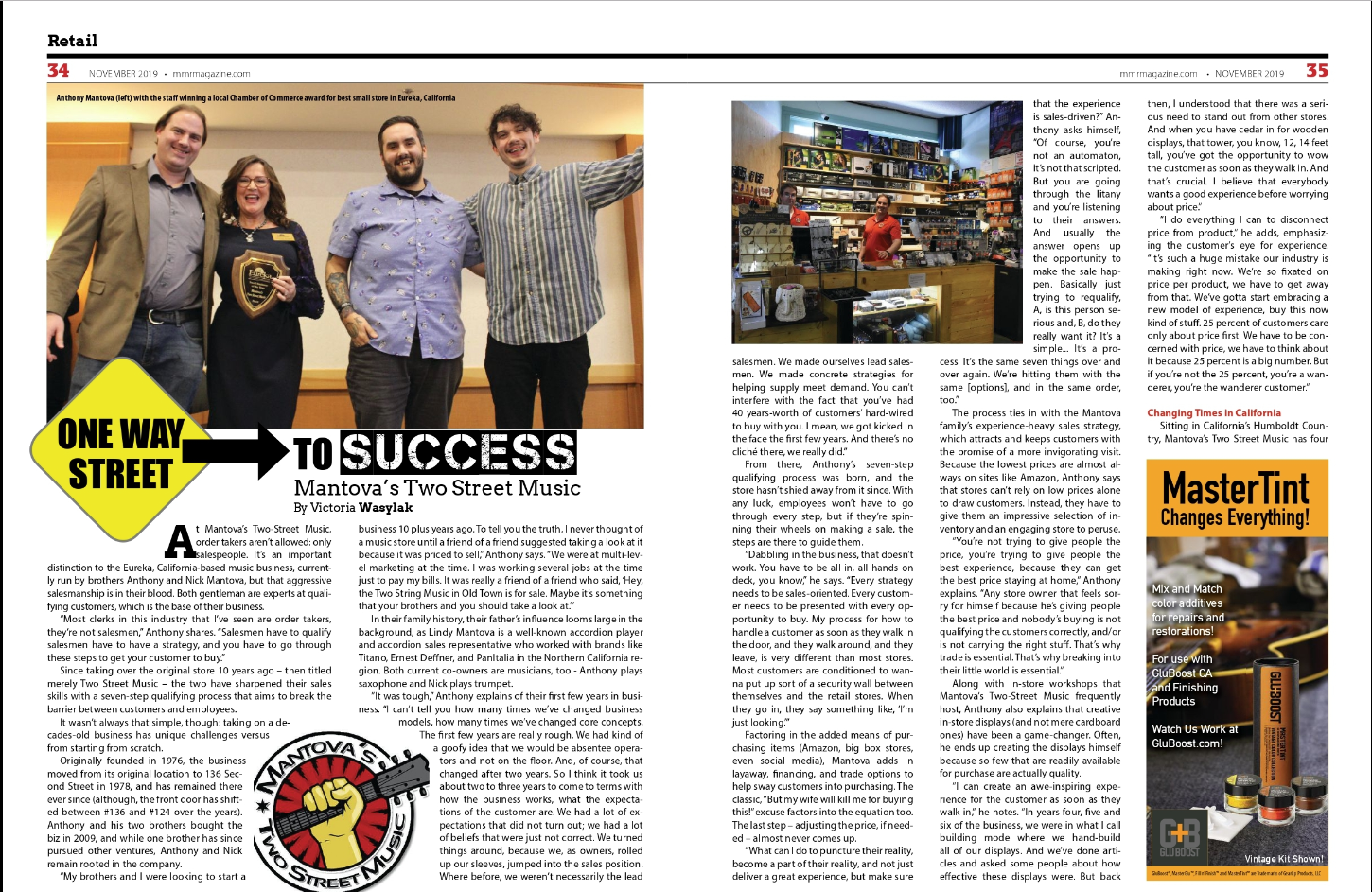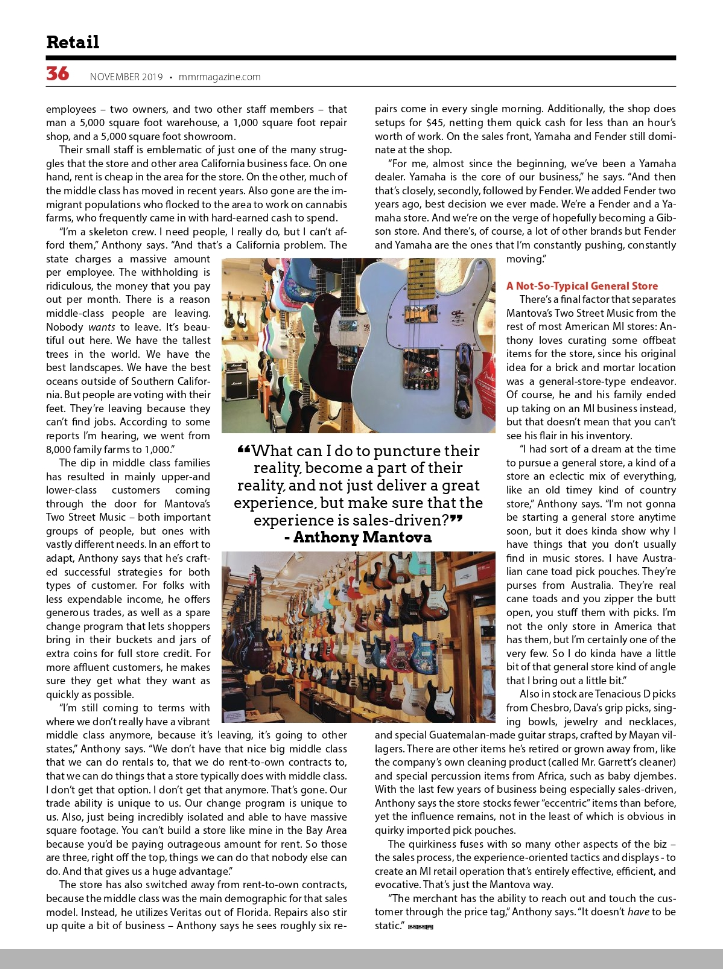Had a good interview in Music Merchandisers Retailer (MMR) Magazine! I had quite a bit of Music Industry 'Insider Baseball' in this interview, but it's a good read for anyone interested in the Woes of California and the modern retailing environment. - Anthony
At Mantova’s Two-Street Music, order takers aren’t allowed: only salespeople. It’s an important distinction to the Eureka, California-based music business, currently run by brothers Anthony and Nick Mantova, but that aggressive salesmanship is in their blood. Both gentleman are experts at qualifying customers, which is the base of their business.
“Most clerks in this industry that I’ve seen are order takers, they’re not salesmen,” Anthony shares. “Salesmen have to qualify salesmen have to have a strategy, and you have to go through these steps to get your customer to buy.”
Since taking over the original store 10 years ago – then titled merely Two Street Music – the two have sharpened their sales skills with a seven-step qualifying process that aims to break the barrier between customers and employees. It wasn’t always that simple, though: taking on a decades-old business has unique challenges versus from starting from scratch.
Originally founded in 1976, the business moved from its original location to 136 Second Street in 1978, and has remained there ever since (although, the front door has shifted between #136 and #124 over the years). Anthony and his two brothers bought the biz in 2009, and while one brother has since pursued other ventures, Anthony and Nick remain rooted in the company.
“My brothers and I were looking to start a business 10 plus years ago. To tell you the truth, I never thought of a music store until a friend of a friend suggested taking a look at it because it was priced to sell,” Anthony says. “We were at multi-level marketing at the time. I was working several jobs at the time just to pay my bills. It was really a friend of a friend who said, ‘Hey, the Two String Music in Old Town is for sale. Maybe it’s something that your brothers and you should take a look at.’” In their family history, their father’s influence looms large in the background, as Lindy Mantova is a well-known accordion player and accordion sales representative who worked with brands like Titano, Ernest Deffner, and PanItalia in the Northern California region. Both current co-owners are musicians, too – Anthony plays saxophone and Nick plays trumpet.
“It was tough,” Anthony explains of their first few years in business. “I can’t tell you how many times we’ve changed business models, how many times we’ve changed core concepts. The first few years are really rough. We had kind of a goofy idea that we would be absentee operators and not on the floor. And, of course, that changed after two years. So I think it took us about two to three years to come to terms with how the business works, what the expectations of the customer are. We had a lot of expectations that did not turn out; we had a lot of beliefs that were just not correct. We turned things around, because we, as owners, rolled up our sleeves, jumped into the sales position. Where before, we weren’t necessarily the lead salesmen. We made ourselves lead salesmen. We made concrete strategies for helping supply meet demand. You can’t interfere with the fact that you’ve had 40 years-worth of customers’ hard-wired to buy with you. I mean, we got kicked in the face the first few years. And there’s no cliché there, we really did.”
From there, Anthony’s seven-step qualifying process was born, and the store hasn’t shied away from it since. With any luck, employees won’t have to go through every step, but if they’re spinning their wheels on making a sale, the steps are there to guide them.
“Dabbling in the business, that doesn’t work. You have to be all in, all hands on deck, you know,” he says. “Every strategy needs to be sales-oriented. Every customer needs to be presented with every opportunity to buy. My process for how to handle a customer as soon as they walk in the door, and they walk around, and they leave, is very different than most stores. Most customers are conditioned to wanna put up sort of a security wall between themselves and the retail stores. When they go in, they say something like, ‘I’m just looking.’”
Factoring in the added means of purchasing items (Amazon, big box stores, even social media), Mantova adds in layaway, financing, and trade options to help sway customers into purchasing. The classic, “But my wife will kill me for buying this!” excuse factors into the equation too. The last step – adjusting the price, if needed – almost never comes up.
“What can I do to puncture their reality, become a part of their reality, and not just deliver a great experience, but make sure that the experience is sales-driven?” Anthony asks himself, “Of course, you’re not an automaton, it’s not that scripted. But you are going through the litany and you’re listening to their answers. And usually the answer opens up the opportunity to make the sale happen. Basically just trying to requalify, A, is this person serious and, B, do they really want it? It’s a simple… It’s a process. It’s the same seven things over and over again. We’re hitting them with the same [options], and in the same order, too.”
The process ties in with the Mantova family’s experience-heavy sales strategy, which attracts and keeps customers with the promise of a more invigorating visit. Because the lowest prices are almost always on sites like Amazon, Anthony says that stores can’t rely on low prices alone to draw customers. Instead, they have to give them an impressive selection of inventory and an engaging store to peruse.
“You’re not trying to give people the price, you’re trying to give people the best experience, because they can get the best price staying at home,” Anthony explains. “Any store owner that feels sorry for himself because he’s giving people the best price and nobody’s buying is not qualifying the customers correctly, and/or is not carrying the right stuff. That’s why trade is essential. That’s why breaking into their little world is essential.”
Along with in-store workshops that Mantova’s Two-Street Music frequently host, Anthony also explains that creative in-store displays (and not mere cardboard ones) have been a game-changer. Often, he ends up creating the displays himself because so few that are readily available for purchase are actually quality.
“I can create an awe-inspiring experience for the customer as soon as they walk in,” he notes. “In years four, five and six of the business, we were in what I call building mode where we hand-build all of our displays. And we’ve done articles and asked some people about how effective these displays were. But back then, I understood that there was a serious need to stand out from other stores. And when you have cedar in for wooden displays, that tower, you know, 12, 14 feet tall, you’ve got the opportunity to wow the customer as soon as they walk in. And that’s crucial. I believe that everybody wants a good experience before worrying about price.”
“I do everything I can to disconnect price from product,” he adds, emphasizing the customer’s eye for experience. “It’s such a huge mistake our industry is making right now. We’re so fixated on price per product, we have to get away from that. We’ve gotta start embracing a new model of experience, buy this now kind of stuff. 25 percent of customers care only about price first.
We have to be concerned with price, we have to think about it because 25 percent is a big number. But if you’re not the 25 percent, you’re a wanderer, you’re the wanderer customer.”
Changing Times in California
Sitting in California’s Humboldt Country, Mantova’s Two Street Music has four employees – two owners, and two other staff members – that man a 5,000 square foot warehouse, a 1,000 square foot repair shop, and a 5,000 square foot showroom.
Their small staff is emblematic of just one of the many struggles that the store and other area California business face. On one hand, rent is cheap in the area for the store. On the other, much of the middle class has moved in recent years. Also gone are the immigrant populations who flocked to the area to work on cannabis farms, who frequently came in with hard-earned cash to spend. “I’m a skeleton crew. I need people, I really do, but I can’t afford them,” Anthony says. “And that’s a California problem. The state charges a massive amount per employee. The withholding is ridiculous, the money that you pay out per month. There is a reason middle-class people are leaving. Nobody wants to leave. It’s beautiful out here. We have the tallest trees in the world. We have the best landscapes. We have the best oceans outside of Southern California. But people are voting with their feet. They’re leaving because they can’t find jobs. According to some reports I’m hearing, we went from 8,000 family farms to 1,000.”
The dip in middle class families has resulted in mainly upper-and lower-class customers coming through the door for Mantova’s Two Street Music – both important groups of people, but ones with vastly different needs. In an effort to adapt, Anthony says that he’s crafted successful strategies for both types of customer. For folks with less expendable income, he offers generous trades, as well as a spare change program that lets shoppers bring in their buckets and jars of extra coins for full store credit. For more affluent customers, he makes sure they get what they want as quickly as possible.
“I’m still coming to terms with where we don’t really have a vibrant middle class anymore, because it’s leaving, it’s going to other states,” Anthony says. “We don’t have that nice big middle class that we can do rentals to, that we do rent-to-own contracts to, that we can do things that a store typically does with middle class. I don’t get that option. I don’t get that anymore. That’s gone. Our trade ability is unique to us. Our change program is unique to us. Also, just being incredibly isolated and able to have massive square footage. You can’t build a store like mine in the Bay Area because you’d be paying outrageous amount for rent. So those are three, right off the top, things we can do that nobody else can do. And that gives us a huge advantage.”
The store has also switched away from rent-to-own contracts, because the middle class was the main demographic for that sales model. Instead, he utilizes Veritas out of Florida. Repairs also stir up quite a bit of business – Anthony says he sees roughly six repairs come in every single morning. Additionally, the shop does setups for $45, netting them quick cash for less than an hour’s worth of work. On the sales front, Yamaha and Fender still dominate at the shop.
“For me, almost since the beginning, we’ve been a Yamaha dealer. Yamaha is the core of our business,” he says. “And then that’s closely, secondly, followed by Fender. We added Fender two years ago, best decision we ever made. We’re a Fender and a Yamaha store. And we’re on the verge of hopefully becoming a Gibson store. And there’s, of course, a lot of other brands but Fender and Yamaha are the ones that I’m constantly pushing, constantly moving.”
A Not-So-Typical General Store
There’s a final factor that separates Mantova’s Two Street Music from the rest of most American MI stores: Anthony loves curating some offbeat items for the store, since his original idea for a brick and mortar location was a general-store-type endeavor. Of course, he and his family ended up taking on an MI business instead, but that doesn’t mean that you can’t see his flair in his inventory.
“I had sort of a dream at the time to pursue a general store, a kind of a store an eclectic mix of everything, like an old timey kind of country store,” Anthony says. “I’m not gonna be starting a general store anytime soon, but it does kinda show why I have things that you don’t usually find in music stores. I have Australian cane toad pick pouches. They’re purses from Australia. They’re real cane toads and you zipper the butt open, you stuff them with picks. I’m not the only store in America that has them, but I’m certainly one of the very few. So I do kinda have a little bit of that general store kind of angle that I bring out a little bit.”
Also in stock are Tenacious D picks from Chesbro, Dava’s grip picks, singing bowls, jewelry and necklaces, and special Guatemalan-made guitar straps, crafted by Mayan villagers. There are other items he’s retired or grown away from, like the company’s own cleaning product (called Mr. Garrett’s cleaner) and special percussion items from Africa, such as baby djembes. With the last few years of business being especially sales-driven, Anthony says the store stocks fewer “eccentric” items than before, yet the influence remains, not in the least of which is obvious in quirky imported pick pouches.
The quirkiness fuses with so many other aspects of the biz – the sales process, the experience-oriented tactics and displays – to create an MI retail operation that’s entirely effective, efficient, and evocative. That’s just the Mantova way.
“The merchant has the ability to reach out and touch the customer through the price tag,” Anthony says. “It doesn’t have to be static.




